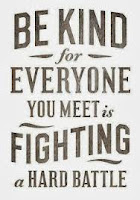There’s a pervasive patronizing, we-they, holier than thou,
superiority complex that we ALL succumb to in relation to other people. There is always someone worse off than we are, more
inferior to us, or in some way 'less' than we are. If you choose to say this does not characterize
you, then you are clearly blind and patently dishonest.
Canada’s recent coming-to-grips with its residential school
past is a gross historical example of this characteristic in play. However, that’s too big for many of us to
relate to. Let’s get closer to
home. Street level.
Around you are:
- people from another culture, perhaps a culture
that brings up very negative emotions or beliefs for you
- addicts – people who perhaps in your mind just
can’t get it together
- homeless & poor people who somehow lost
their grip on life skills and the disciplines to ‘make it’
- those with a mental illness, who are not in
touch with (your) reality
- people trapped in or celebrating a lifestyle you
fundamentally think is wrong
- someone who hates your religion/faith or who
just deeply questions everything
In some way, they are broken. But so are you! And this latter fact is the one most lost on
us in relation to the rest of society. It affects our ability to identify, love
and have compassion.
Somehow, we as Christians have come to believe that we have
the solution to the world. Of course it is true that surrender to and following the person of Jesus is the Solution. He came to give us abundant and meaningful
living both now and for eternity. But in
believing in that solution, we Christians often and unfortunately accompany it with a perverse and
inaccurate sense that we are now whole.
Better than others. That subtle
lie implies the other person is not whole and therefore somehow is less than us. It results in a patronizing attitude toward their 'needs'. Worse, it breeds a judgemental spirit.

What if we were to take the more theologically accurate and
very human perspective that we ourselves are broken and walk with the other in
their brokenness?
We are saved by
grace and n
ot by anything we have
done.
Daily we (well, maybe just me) struggle with elements of our brokenness. So in a sense we are both beggars looking
for food.
Both sojourners looking for a
destination.
Both imperfect people
seeking wholeness.
Both humbly walking
together knowing we need each other and are in need of the great Other.
What might this do for us – the Church?
- It would release us from a BA (‘believers arrogance")
- It would make us more patient and accepting of
the brokenness that is all around us
- It would make us more human
- It would help us see that our walking with the
broken is actually our calling
- It would save us from classifying
brokenness. We are ALL broken and in
need of healing and wholeness. (Have you
ever noticed that the church has ‘white collar’ sins that don’t get the same
focus and judgement as other sins??)
I am no saint in this.
It’s a fresh lesson I am learning as I walk with someone affected by
addictions. They are broken. Other addicts are broken. It has been so heartbreaking to watch. BUT the process (AA) has brought me face to face with
my own brokenness and need for the Saviours' grace and power to change. One key to the recovery of these addicts is
not judgement of their condition or rescuing them with the good intentions of money or promises or enabling actions, but the acceptance of others in the program
who also admitted they were broken. That
created camaraderie, a fellowship, a common humanity. They all know they struggle, and it created a context in which restoration
could happen.
 Restoration and salvation occurs in a context of loving
acceptance
Restoration and salvation occurs in a context of loving
acceptance.
You will NEVER argue,
browbeat or rationalize someone into faith in Jesus. You certainly won’t by placing yourself above
them. But it just might happen if you
come alongside, as a fellow broken human to demonstrate the hope you have in
Jesus and the frailty you also possess as a human.
In the context of teaching a young leader to avoid the
senselessness and the damage excessive wordiness and theological condescension
will inflict, the apostle Paul (2 Timothy 2) went on to say to Timothy that he
should:
- Stop trying to quarrel your way to helping
someone believe
- Be kind to everyone
- Be patient with difficult people
- Teach gently & effectively because “perhaps”
God will change their hearts
Did you get that last bullet? “Perhaps”.
You see it isn’t up to us to change someone. It’s up to God Himself. Even then, there is no guarantee. “Perhaps” God will change them. Until that happens:
Walk as the broken with the broken
Demonstrate and describe the Saviour
Honour the free choice of the person
Continue the walk no matter their choice..."Perhaps"
Surrender yourself and them to the will and power of God.
Walk as the broken with the broken
 It’s happened to me.
I pursued a dream (a God-given
dream at that) to develop a ministry to international teams. Left Canada for Kuwait in 2009. Came back in 2010 crushed. The life I now live isn’t what I
planned. It’s good, but there is a
nagging sense that an ‘other’ life has eluded me. The prospects of ever re-engaging it are
fading.
It’s happened to me.
I pursued a dream (a God-given
dream at that) to develop a ministry to international teams. Left Canada for Kuwait in 2009. Came back in 2010 crushed. The life I now live isn’t what I
planned. It’s good, but there is a
nagging sense that an ‘other’ life has eluded me. The prospects of ever re-engaging it are
fading.




